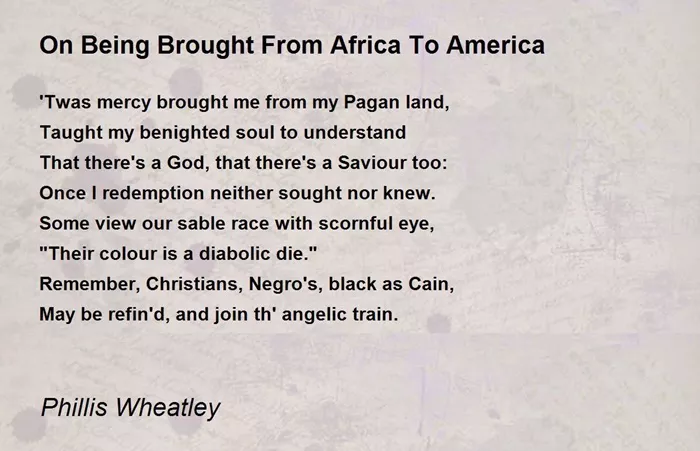Welcome to Poem of the Day – On Being Brought from Africa to America by Phillis Wheatley.
Phillis Wheatley’s poem On Being Brought from Africa to America is one of her most renowned works. Written by one of the first African American women to publish poetry in America, it reflects her thoughts on faith, race, and identity. The poem is short yet profound, addressing themes that continue to resonate today.
On Being Brought from Africa to America Poem
‘Twas mercy brought me from my Pagan land,
Taught my benighted soul to understand
That there’s a God, that there’s a Saviour too:
Once I redemption neither sought nor knew.
Some view our sable race with scornful eye,
“Their colour is a diabolic die.”
Remember, Christians, Negros, black as Cain,
May be refin’d, and join th’ angelic train.
On Being Brought from Africa to America Poem Explanation
Phillis Wheatley’s poem explores her journey from Africa to America as an enslaved individual. Despite the painful reality of her enslavement, the poem focuses on her gratitude for her introduction to Christianity. Through the poem, Wheatley communicates her belief in redemption, equality, and faith.
The poem also challenges the prejudices of the time by asserting that salvation is universal, regardless of race. This is particularly significant given the racial discrimination she experienced during her lifetime.
Summary of On Being Brought from Africa to America
The poem begins with Wheatley expressing gratitude for being brought to America, where she was introduced to Christianity. She acknowledges her initial “benighted” state—referring to her lack of Christian faith before her enslavement.
Wheatley then addresses the prejudices of her time by reminding readers that all individuals, regardless of race, can achieve salvation. She specifically counters the racist notion that Black people are inherently inferior or incapable of redemption. The poem concludes with a powerful message that both Black and white individuals are equal in the eyes of God.
Structure and Form
The poem is a single stanza of eight lines written in heroic couplets. Each pair of lines rhymes, following an AABBCCDD rhyme scheme. The meter is iambic pentameter, giving the poem a formal and rhythmic flow.
This structured form reflects the neoclassical style popular during Wheatley’s time. Its polished and concise nature allows Wheatley to convey her message with clarity and precision.
Detailed Explanation of Major Elements
1. Themes
Faith and Redemption: Wheatley views her conversion to Christianity as a form of spiritual salvation, despite the physical and emotional toll of her enslavement.
Equality in Salvation: She emphasizes that salvation is not limited by race, challenging the racist ideologies of her era.
Gratitude and Complexity: Wheatley’s gratitude for her Christian faith complicates the narrative of her forced journey to America, blending pain with spiritual acceptance.
2. Language and Tone
Wheatley uses refined and formal language, characteristic of neoclassical poetry. Her tone is respectful yet assertive, carefully balancing gratitude with subtle critique.
3. Imagery and Symbolism
“Pagan land”: Refers to Africa before her Christian conversion, reflecting the 18th-century view of non-Christian cultures as “heathen.”
“Black as Cain”: Alludes to the biblical figure of Cain, often associated with sin. Wheatley challenges this negative association, asserting that all individuals can be “refined” through faith.
“Angelic train”: Symbolizes divine grace and inclusion in heaven, reinforcing the theme of universal salvation.
4. Cultural and Historical Context
Phillis Wheatley wrote during a time of intense racial prejudice and enslavement. Her position as an enslaved poet and her literacy were exceptional for the period. Through her poetry, she challenged societal norms while maintaining a tone that allowed her work to be accepted by white audiences.
Conclusion
On Being Brought from Africa to America is a complex and layered poem. It reveals Phillis Wheatley’s ability to convey deep themes of faith, equality, and redemption within a tightly structured and eloquent framework. While expressing gratitude for her introduction to Christianity, Wheatley subtly critiques the societal prejudices of her time. Her work remains a testament to the power of poetry as a means of resistance and reflection.

